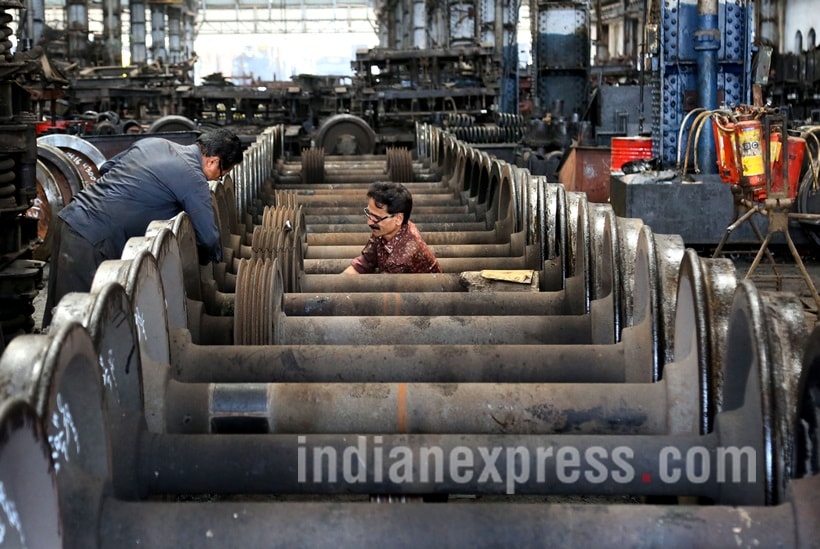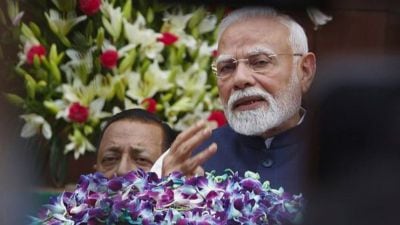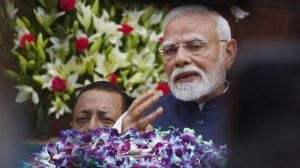Matunga Carriage Workshop turns 100
Established in 1915, it was set up as a repair workshop for broad gauge and narrow gauge coaches and wagons of the erstwhile Great Indian Peninsular (GIP) Railway.
 Union Railways Minister Suresh Prabhu flags off the celebrations of Matunga carriage workshop. Express photo
Union Railways Minister Suresh Prabhu flags off the celebrations of Matunga carriage workshop. Express photo
Spread across 35 hectares with a staff of nearly 8,200 people, the Matunga Carriage Workshop of the Central Railway on Thursday celebrated 100 years of service, and become the first zonal workshop to complete a centenary of service in India.
Established in 1915, it was set up as a repair workshop for broad gauge and narrow gauge coaches and wagons of the erstwhile Great Indian Peninsular (GIP) Railway. The workshop, at present, is estimated to manufacture around 2,000 coaches per annum in terms of four-wheeler units.

Mahesh Kumar, Chief Workshop Manager, said today was an important day in the history of the zonal workshop.”Positive contribution and attitude of our employees have made us achieve this. It sets pace for our future and we promise to do much better.”
[related-post]
Suresh Prabhu, Union Minister for Railways, who was present to mark the celebration, spoke of the workshop’s contribution to India railways. “The workshop has been one of the reasons behind the strengthening of Indian Railways. Sincere efforts to increase the use of this workshop to make many more amenities for commuters would be the goal.”
The workshop has also been at the forefront of designing the ‘Green Toilet’, a system that prevents water wastage and helps in corrosion of rail tracks, which is currently used in many Indian rail services. Apart from that, maintenance of the President of India’s salon and modification of the Lifeline Express and the Deccan Odyssey have also been some of its achievements.
Amit Saurastri, Deputy Chief Engineer of the workshop, called the place the lifeline for the smooth functioning of Central Railways, “ Had there been no Matunga workshop, efficiency in the functioning of Central railways would have suffered. Right from safer designing of coaches to implementing passenger amenities, our workshop looks after it all.”
Hemant Shinde, one of the oldest employees at the workshop felt nostalgic over the changes the workshop has see. “I feel proud to have spent 33 years of my service in the workshop. It has been like my second home which also gave me my daily bread.”
However, employees also pointed at the declining number of workforce in the carriage workshop over the number of years which has been replaced by newer machinery. A worker who did not want to be named also pointed at how fewer hands are doing more work.
“ Compared to 16,000 employees in the past who would take up different portions of work, lesser people are being assigned more work. The increased amounts of outsourcing has also badly reflected on the employment rates of the workshop.”
The workshop has also not shied away from employing women employees for tough jobs like wielding, carpentry and handling machines. Honoring some of them on this occasion, the ladies smilingly described their ‘work of courage’. Shivani Kumar, a wheel coaster, who was rewarded for her work said, “It is not everyday that women like us are acknowledged for our work. This should inspire other women to successfully take up tough jobs like wielding, carpentry and others and be dedicated towards it.”
The train ride
In order to avoid the heavy traffic on Mumbai lanes, Suresh Prabhu,Minister of Railways used the local train to take a ride from Currey Road station to Chhatrapati Shivaji Terminus station (CST) on the Central Railway’s main line on Wednesday afternoon. The Minister of Railways did the commute along with Mayor Snehal Ambekar after laying the foundation stone for the new foot over-bridge at Currey Road station. The team then headed to meet Chief Minister Devendra Fadnavis in Mantralaya.
WATCH INDIAN EXPRESS VIDEOS HERE












